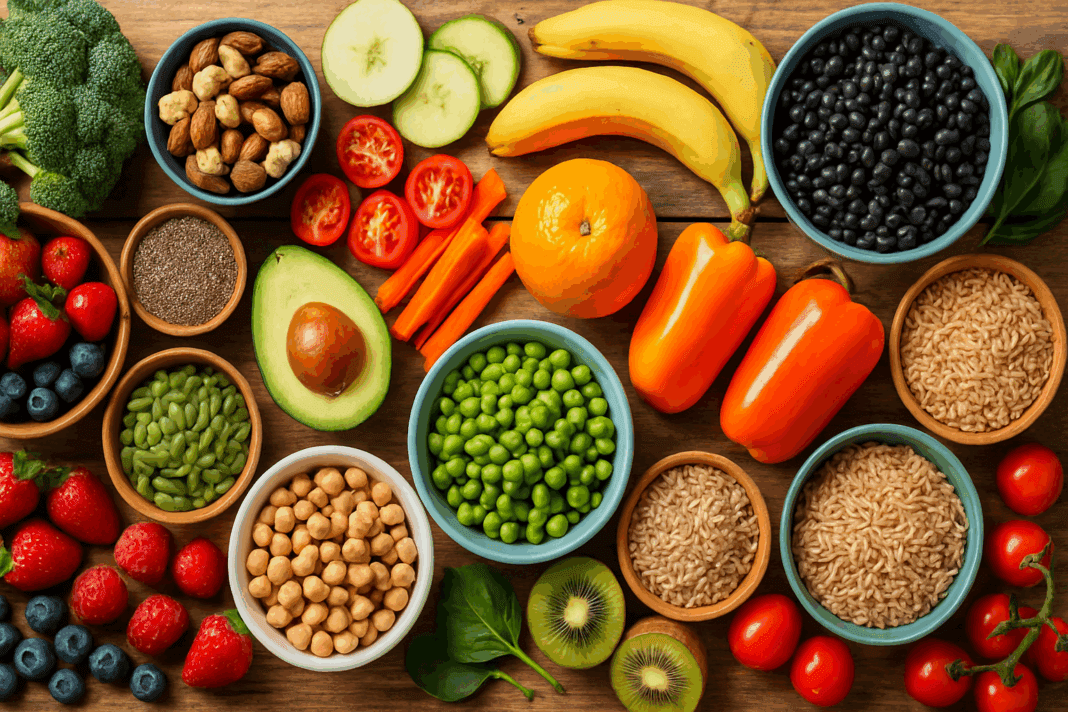In today’s fast-paced world, snacking has become more than just a means to curb hunger between meals. It’s an integral part of daily nutrition, offering opportunities to replenish energy, stabilize blood sugar, and deliver essential nutrients. For those embracing a plant-based lifestyle, snacks are not just filler—they’re functional fuel. When chosen wisely, snacks can enhance the health benefits of a whole food plant based diet, support weight management, and satisfy cravings without compromising nutritional goals. But how do we distinguish between truly healthy plant based snacks and those that merely wear a health halo?
You may also like: Healthy Plant-Based Dinners Made Easy: Best Whole Food Plant-Based Recipes for Beginners and Beyond
This article dives deep into the science of smart snacking within a plant-based framework. Drawing on evidence from nutritional research, we’ll explore the best whole food plant based snacks, why they’re effective, and how to seamlessly incorporate them into a daily routine. Whether you’re transitioning to a more plant-forward way of eating or fine-tuning an already plant-centric lifestyle, understanding the role of nutrient-dense, minimally processed snacks is essential for long-term success.
Redefining Snacks in a Whole Food Plant Based Diet
The conventional concept of a snack often conjures images of chips, cookies, or granola bars—many of which are ultra-processed and rich in refined sugars, oils, and artificial ingredients. Even in the plant-based space, it’s easy to fall into the trap of choosing items that are technically vegan but far from nutritionally optimal. A plant-based label does not always equate to health. For instance, a store-bought vegan brownie or faux-cheese puff may be animal-product-free, yet lack fiber, micronutrients, and protein.
Whole food plant based snacks, on the other hand, shift the paradigm. These snacks emphasize ingredients in their most natural or minimally altered forms—think fresh fruits, vegetables, legumes, nuts, seeds, and whole grains. Instead of relying on additives for flavor or texture, they harness the natural synergy of plant compounds to deliver taste, satiety, and nourishment. The focus is on nutrient density, not calorie density.
From a scientific standpoint, nutrient-dense snacks help maintain blood glucose levels, prevent overeating at meals, and provide an opportunity to meet daily fiber and phytonutrient targets. They also support gut health and immune function, thanks to their high content of prebiotics, antioxidants, and anti-inflammatory compounds. In this way, healthy plant based snacks become a cornerstone of wellness, not a dietary afterthought.
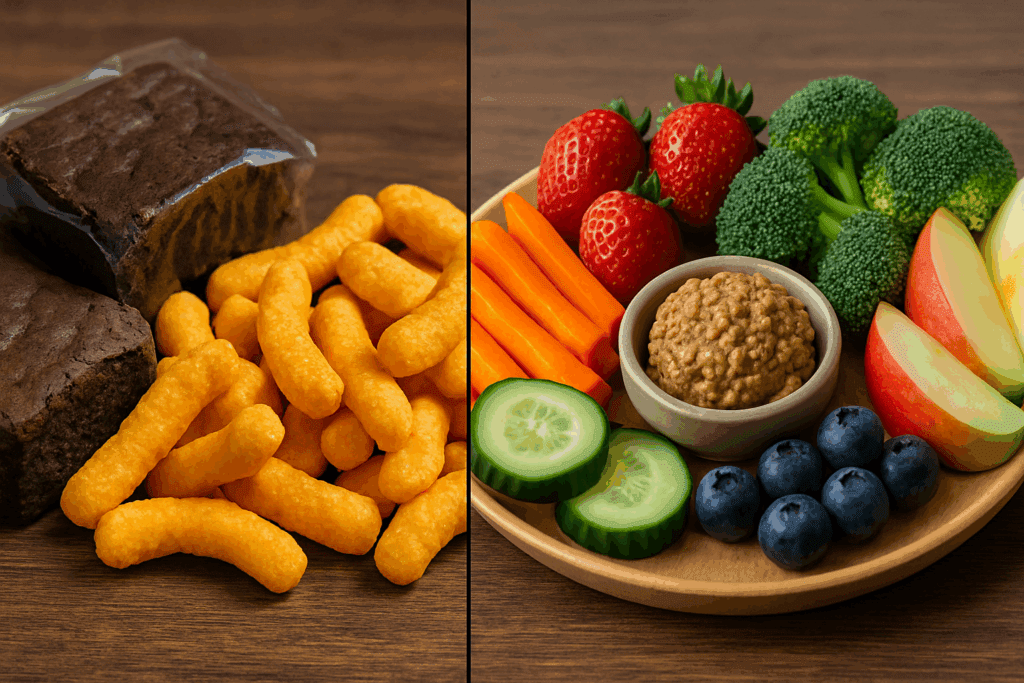
The Science Behind Smart Plant-Based Snacking
Scientific literature continues to highlight the positive associations between plant-based diets and reduced risk of chronic diseases such as heart disease, type 2 diabetes, and certain cancers. Much of this benefit is due to the consistent intake of fiber, polyphenols, vitamins, and minerals found in unrefined plant foods. When applied to snacking, these same principles apply: quality trumps quantity, and whole foods outperform processed alternatives.
Studies show that fiber-rich snacks can help improve satiety and decrease overall caloric intake throughout the day. For instance, a randomized controlled trial published in the journal Appetite found that participants who consumed a high-fiber bean snack reported greater feelings of fullness and reduced hunger compared to those who consumed a lower-fiber snack with the same calories. This suggests that whole food plant based snacks can play a strategic role in managing weight and appetite.
Additionally, plant-based diet snacks that include whole grains, legumes, or seeds have been shown to positively influence postprandial glycemic response. This is particularly important for individuals managing insulin resistance or seeking stable energy levels. The slower digestion of complex carbohydrates, combined with the presence of protein and healthy fats, helps maintain metabolic balance—one of the key advantages of choosing nutrient-rich snacks.
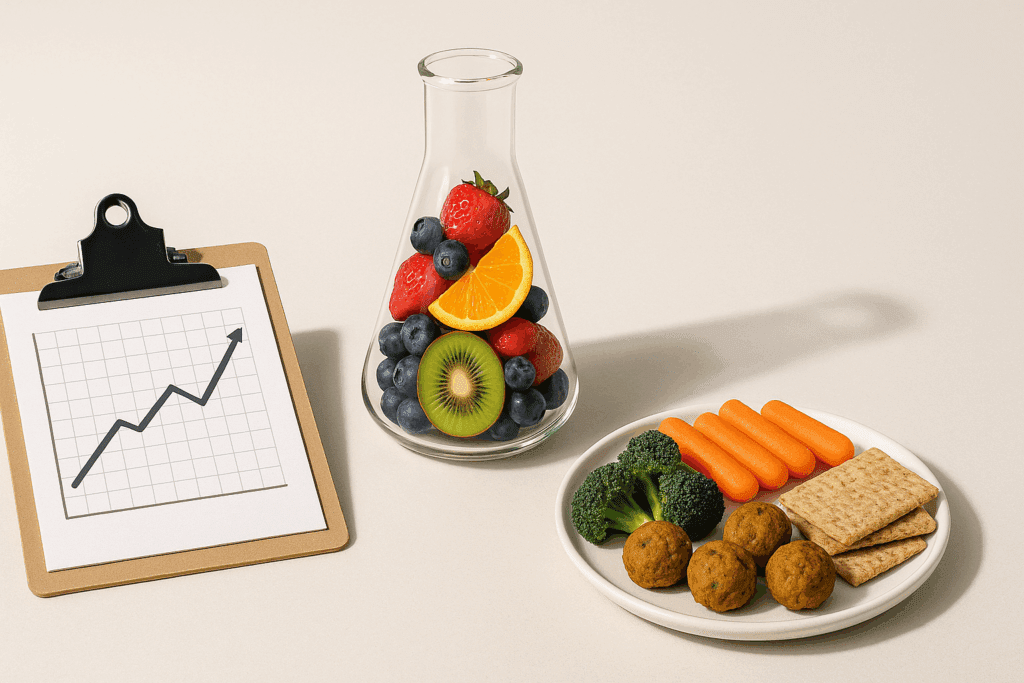
Best Whole Food Plant Based Snacks for Energy and Endurance
When energy is waning, the right snack can make a noticeable difference in focus, performance, and mood. But reaching for a sugary pick-me-up is often counterproductive. While high-glycemic snacks may provide a quick burst of energy, they are usually followed by an equally swift crash, leaving one feeling fatigued and irritable. In contrast, whole food plant based diet snacks with a balance of complex carbs, protein, and healthy fats offer sustained energy.
A classic example is a small serving of apple slices paired with almond butter. The apple delivers natural sugars and fiber, while the almond butter contributes protein and monounsaturated fats that slow digestion and prolong energy release. Another excellent option is a small bowl of edamame, which supplies complete plant protein and a range of micronutrients including iron and folate—both essential for oxygen transport and cellular energy.
Homemade trail mix made from unsweetened dried fruit, pumpkin seeds, and raw walnuts is another smart choice. Unlike commercial trail mixes, which often include added oils and sugars, a DIY version allows control over ingredients and ratios. This snack provides magnesium, omega-3 fatty acids, and zinc—nutrients known to support cognitive function and reduce fatigue.
These kinds of wfpb snacks not only deliver sustained energy but also nourish the body in ways that support long-term metabolic health, demonstrating that smart snacking is as much about function as it is about flavor.
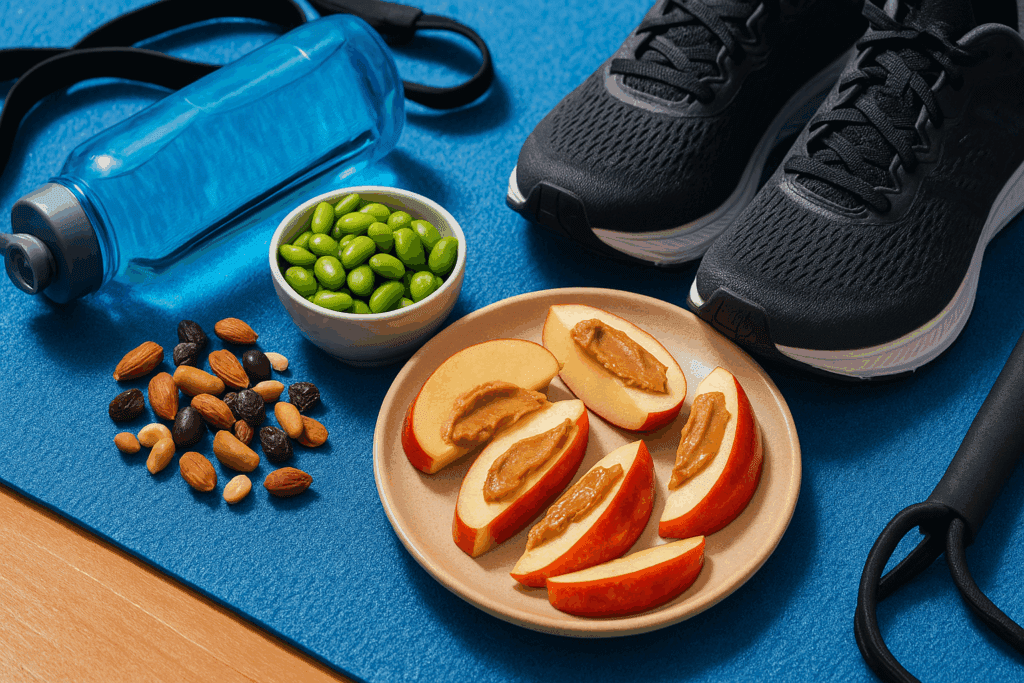
Supporting Gut Health with Fiber-Focused Plant Based Snacks
Gut health is a major focus in modern nutrition science, and for good reason. The trillions of microbes residing in our intestines play a critical role in digestion, immune function, mood regulation, and even weight management. A diverse and balanced gut microbiome depends heavily on the types of food we consume—and snacks offer another opportunity to feed beneficial microbes.
Plant based snacks rich in fiber, particularly prebiotic fiber, help support microbial diversity. Foods such as bananas, oats, lentils, and flaxseeds provide substrates for fermentation by gut bacteria, resulting in the production of short-chain fatty acids like butyrate. These compounds have anti-inflammatory properties and help maintain the integrity of the gut lining.
Roasted chickpeas, for example, make a crunchy, satisfying snack and are rich in both insoluble and soluble fiber. Their resistant starch content promotes the growth of Bifidobacteria, one of the gut’s most beneficial microbial groups. Similarly, a bowl of chia pudding made with unsweetened almond milk and fresh berries offers omega-3s, antioxidants, and mucilaginous fiber that helps regulate digestion.
Even simple combinations—such as carrot sticks dipped in hummus—can go a long way in enhancing gut health. The carrots provide fiber and beta-carotene, while the chickpeas and tahini in hummus offer protein and minerals. These healthy snacks for plant based diet enthusiasts are not just filling—they actively contribute to internal health at the microbial level.
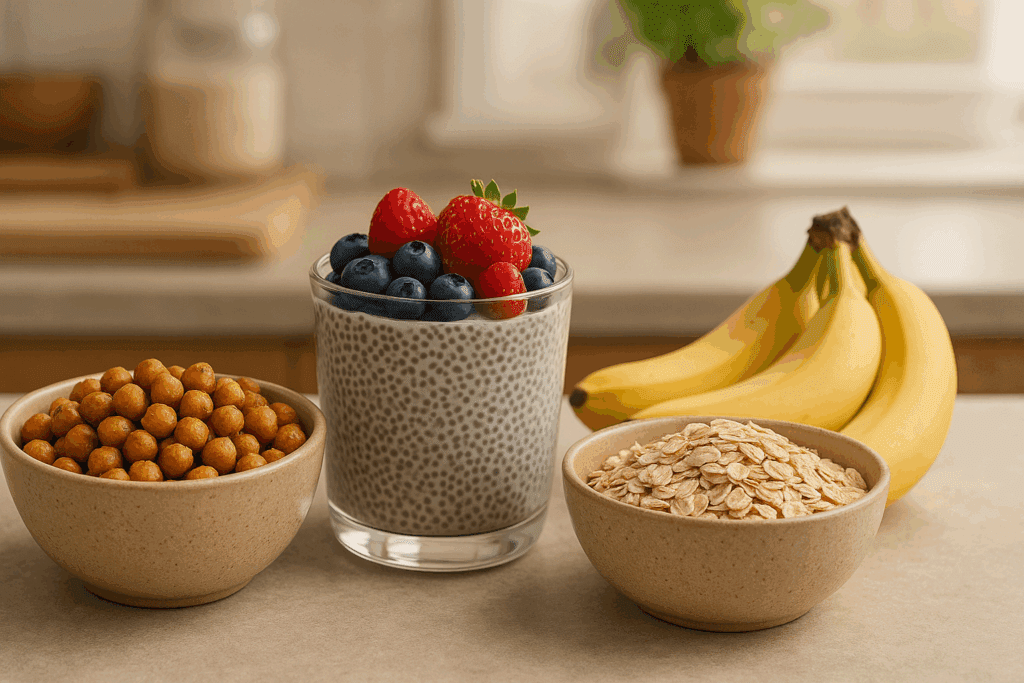
Protein-Rich Snacks for Plant-Based Eaters
One common concern among those transitioning to a plant-based lifestyle is protein adequacy. While the fear of protein deficiency is largely overstated, it remains important to include protein-rich foods throughout the day, including in snacks. Fortunately, there is no shortage of whole food plant based snacks that can contribute meaningfully to daily protein intake without relying on processed protein bars or powders.
Lentil salad cups, tofu cubes with tamari, and nut-and-seed granola clusters all pack a protein punch. Even a slice of sprouted grain toast topped with avocado and hemp seeds can provide over 10 grams of protein, along with healthy fats and fiber. These options are particularly valuable for active individuals who need to support muscle repair and recovery.
Another underrated choice is tempeh jerky, which is increasingly available in health food stores or can be made at home. Made from fermented soybeans, tempeh is dense in protein and also offers probiotics, making it a dual-function snack. Paired with a piece of fruit or a handful of nuts, it becomes both balanced and satisfying.
Including these kinds of best plant based snacks in your rotation not only eases the protein question but also ensures variety and enjoyment in your diet. And when snacks taste good and feel good, they become sustainable.
Weight Management and Satiety: The Role of Plant-Based Diet Snacks
Snacking often gets a bad rap when it comes to weight control, but the problem lies not in the act of snacking itself, but in the quality and quantity of what is consumed. Whole food plant based snacks can actually assist in weight management by preventing overeating at meals and minimizing blood sugar fluctuations that lead to cravings.
A study published in the American Journal of Clinical Nutrition found that individuals who included low-energy-dense snacks—those high in water and fiber content—tended to consume fewer total calories throughout the day. Examples include cucumber slices with guacamole, air-popped popcorn seasoned with nutritional yeast, or a smoothie made with frozen berries, leafy greens, and ground flaxseeds.
These snacks are naturally satiating without being calorie-dense. The volume they add to the stomach stimulates stretch receptors that signal fullness to the brain. Furthermore, their complex nutrient profiles promote hormonal responses—such as increased cholecystokinin (CCK) and peptide YY—that help regulate appetite and satiety.
It’s important to highlight that snacking should not be driven by boredom or stress but should be an intentional practice guided by hunger and nutritional needs. Choosing whole food plant based diet snacks that are flavorful, balanced, and nutrient-rich can make this practice both effective and enjoyable, ultimately supporting a healthy body composition and relationship with food.
Sweet Cravings and Natural Plant-Based Solutions
Sweet cravings are natural and often stem from biological cues, emotional triggers, or simply habit. The good news is that satisfying a sweet tooth doesn’t have to involve processed sugars or nutritionally void treats. Many whole food plant based snacks offer natural sweetness along with fiber, antioxidants, and even protein.
Medjool dates, for instance, are nature’s candy—but with benefits. Stuffed with almond butter or paired with a few raw cacao nibs, they become a decadent yet wholesome treat. Dates are rich in potassium, magnesium, and polyphenols that contribute to cardiovascular and digestive health.
Another excellent option is baked cinnamon apples. When sliced and roasted with a sprinkle of cinnamon and walnuts, apples transform into a dessert-like snack that stabilizes blood sugar and provides soluble fiber. For a chilled option, banana “nice cream” made from frozen bananas blended with a splash of oat milk can be a delightful post-dinner treat.
These healthy plant based snacks allow individuals to enjoy sweetness without undermining health goals. More importantly, they retrain the palate to appreciate the subtleties of natural sugars, helping to reduce dependence on processed sweets over time.
Convenience Without Compromise: Portable and Prepped WFPB Snacks
Modern lifestyles demand snacks that are not only healthy but also portable and convenient. Fortunately, there are many plant based diet snacks that travel well and require minimal preparation. With a little foresight, it’s possible to stock a backpack, briefcase, or glove compartment with nourishing options that align with whole food plant based values.
Mason jar salads, rice paper rolls filled with veggies and tofu, or roasted sweet potato wedges are all excellent examples. These can be prepared in advance and consumed cold or at room temperature. For dry snacks, unsweetened energy balls made with oats, tahini, dates, and chia seeds are shelf-stable and easy to transport.
Store-bought options can also be part of the equation when chosen carefully. Look for brands offering dehydrated fruit with no added sugars, baked lentil chips with minimal oil, or seaweed snacks that are low in sodium and free from preservatives. When labels are short and ingredients recognizable, packaged snacks can still uphold the integrity of a whole food plant based diet.
Ultimately, the best plant based snacks are those that meet practical needs without sacrificing nutrition. They allow plant-based eaters to maintain their dietary standards even when away from home, reinforcing consistency and success.
Embracing the Power of Plants Between Meals
Snacking is not a detour from healthy eating—it’s an integral part of it. For individuals following a plant-based lifestyle, snacks offer a meaningful way to extend the benefits of whole plant foods beyond breakfast, lunch, and dinner. They provide opportunities to experiment with flavors, textures, and global ingredients, keeping the diet dynamic and enjoyable.
What sets whole food plant based snacks apart is their ability to combine simplicity with sophistication. A handful of roasted nuts, a slice of avocado on whole grain toast, or a bowl of berries with a dollop of cashew cream are as easy to prepare as they are delicious. These snacks reflect a culinary tradition rooted in nature, offering both nourishment and pleasure.
As more people adopt plant-based lifestyles for health, environmental, and ethical reasons, the importance of well-chosen snacks becomes even more pronounced. They are the quiet moments of nutrition that, when added together, make a significant impact on long-term wellness.
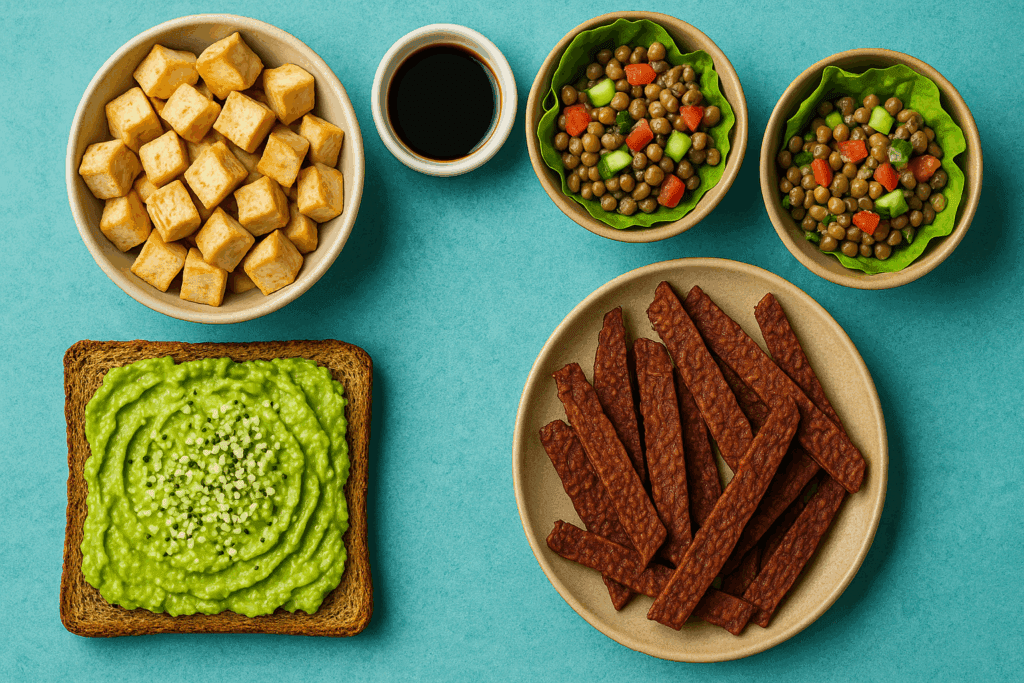
Frequently Asked Questions (FAQ): Smart Snacking on a Plant-Based Diet
1. How can plant based snacks help regulate appetite and prevent overeating throughout the day?
Many people underestimate the power of strategically timed plant based snacks to manage hunger hormones and curb impulsive eating later in the day. Unlike ultra-processed snack foods, whole food plant based snacks tend to be rich in fiber, which slows digestion and promotes satiety. This helps stabilize blood sugar levels and reduces the likelihood of rebound hunger or sugar crashes. Additionally, the act of pausing for a nutrient-dense snack encourages mindful eating, which research has linked to better appetite regulation. Consistent use of healthy plant based snacks between meals may support better portion control at main meals and reduce overall caloric intake without relying on willpower alone.
2. What are some strategies for making plant based diet snacks more exciting for kids or picky eaters?
Presentation and interactivity are key when introducing plant based diet snacks to children or individuals with selective palates. Try making snack boards with a rainbow of colors—think hummus with baby carrots, bell pepper strips, and purple cabbage. Fun shapes or DIY build-your-own options, such as mini avocado toast stations or frozen fruit skewers, turn snacking into a playful activity. To encourage nutrient diversity, rotate between savory and sweet options while keeping textures varied. Consistently offering healthy snacks for a plant based diet in fun formats fosters familiarity and reduces resistance over time, especially when children are involved in snack prep.
3. Are there any surprising benefits of choosing whole food plant based snacks over processed vegan options?
Absolutely. While both may be plant-based, whole food plant based snacks offer advantages that processed vegan options often lack. They’re typically free of additives, preservatives, and refined sugars, which supports better gut microbiome balance—an emerging area of interest in plant-based nutrition. Studies suggest that individuals who rely on wfpb snacks have lower levels of inflammatory biomarkers and better metabolic flexibility. Over time, this could translate into improved immune function and lower risk of insulin resistance. Choosing the best plant based snacks with minimal ingredients may even enhance taste preferences toward naturally sweet or savory flavors, reducing dependency on overly engineered tastes.
4. How can you make plant based snacks more convenient for a busy work schedule or frequent travel?
Preparation is everything. Batch-prepping plant based snacks at the start of the week—such as roasted chickpeas, date-nut energy balls, or pre-portioned trail mix—makes healthy choices effortless during hectic moments. For travelers, shelf-stable wfpb snacks like dried fruit with no added sugar, nut butter packets, and whole grain crackers with seed toppings are portable and satisfying. Storing a snack emergency kit in your car or bag helps you bypass less nutritious vending machine options. The key to successful healthy snacks for a plant based diet on-the-go is a mix of macronutrients (carbs, fats, and proteins) to keep energy levels steady throughout the day.
5. What role do plant based snacks play in long-term weight management?
Incorporating healthy plant based snacks can contribute significantly to sustainable weight management, especially when used strategically to prevent over-hunger. Rather than fueling the restrict-binge cycle common in calorie-cutting approaches, whole food plant based diet snacks provide nutrient density without excess calories. Fiber and water content in fruits, vegetables, and legumes offer volume that keeps you full while remaining low in energy density. In contrast to calorie-heavy processed foods, plant based snacks emphasize quality over quantity, which may enhance metabolic health and long-term adherence. Snacking, when done mindfully, can reduce psychological deprivation—a key barrier to lasting weight loss.
6. Can plant based snacks support athletic recovery and muscle growth?
Yes, particularly when they’re rich in plant proteins and anti-inflammatory nutrients. Athletes often benefit from plant based diet snacks that combine protein with complex carbohydrates post-workout to replenish glycogen stores and kickstart muscle repair. Options like lentil-based protein bites, edamame, or a smoothie with pea protein, banana, and flaxseed provide amino acids and phytonutrients that support recovery. Antioxidants from berries or dark leafy greens found in healthy plant based snacks can also help combat oxidative stress after intense exercise. Including whole food plant based snacks in a post-exercise routine can align fitness goals with ethical or dietary preferences without compromising performance.
7. How can plant based snacks support better mental focus and mood throughout the day?
Nutrient-rich plant based snacks can stabilize energy levels and reduce mood fluctuations linked to blood sugar imbalances. For example, pairing complex carbohydrates with healthy fats—like apple slices with almond butter—slows glucose absorption, offering steady fuel to the brain. Some whole food plant based snacks, like walnuts, chia seeds, and pumpkin seeds, contain omega-3 fatty acids and magnesium, which are associated with improved cognitive function and reduced symptoms of anxiety or depression. Having wfpb snacks on hand may reduce reliance on caffeine or sugary treats during afternoon slumps, supporting more consistent productivity and emotional regulation.
8. What are some lesser-known ingredients that make excellent additions to healthy plant based snacks?
A few underutilized ingredients can elevate both the nutrition and flavor profile of healthy snacks for a plant based diet. For instance, lupini beans are an excellent source of plant protein and fiber, perfect for snacking right out of the jar or tossing into a trail mix. Seaweed snacks provide iodine and umami flavor, and unsweetened cocoa nibs add antioxidant richness to nut and fruit mixes. Tiger nuts (actually tubers) offer resistant starch for gut health. Exploring global cuisines can also reveal new ideas for best plant based snacks, such as Middle Eastern muhammara or South American tamarillo salsa with veggie sticks.
9. How do cultural and social influences shape perceptions of plant based snacking?
Cultural norms heavily influence how plant based diet snacks are perceived, accepted, and adopted. In Western cultures, snacking often leans toward convenience and indulgence, but traditional diets in Asia, the Mediterranean, and Latin America incorporate natural whole food plant based snacks like steamed edamame, roasted chestnuts, or fruit with chili and lime. Social environments can also create peer pressure around processed snack norms—think chips at a party or vending machines at work. Reframing healthy plant based snacks as vibrant, shareable, and flavorful alternatives helps shift perceptions and builds positive associations in group settings. Celebrating the culinary diversity of wfpb snacks is key to broader acceptance.
10. What are some emerging trends and innovations in the plant based snack industry?
The plant based snacks market is evolving rapidly, with a growing emphasis on functional ingredients. Many newer products now include adaptogens like ashwagandha, prebiotic fibers for gut health, or fermented bases like miso and tempeh for added probiotic benefits. There’s also a push toward upcycled ingredients—such as using fruit peels or pulp byproducts—to reduce food waste while creating healthy snacks for a plant based diet. Advances in food tech are enabling snack bars and chips made from algae, jackfruit, or fava bean protein. As consumer demand increases, the best plant based snacks are those that merge science-backed nutrition with environmental and ethical sustainability.
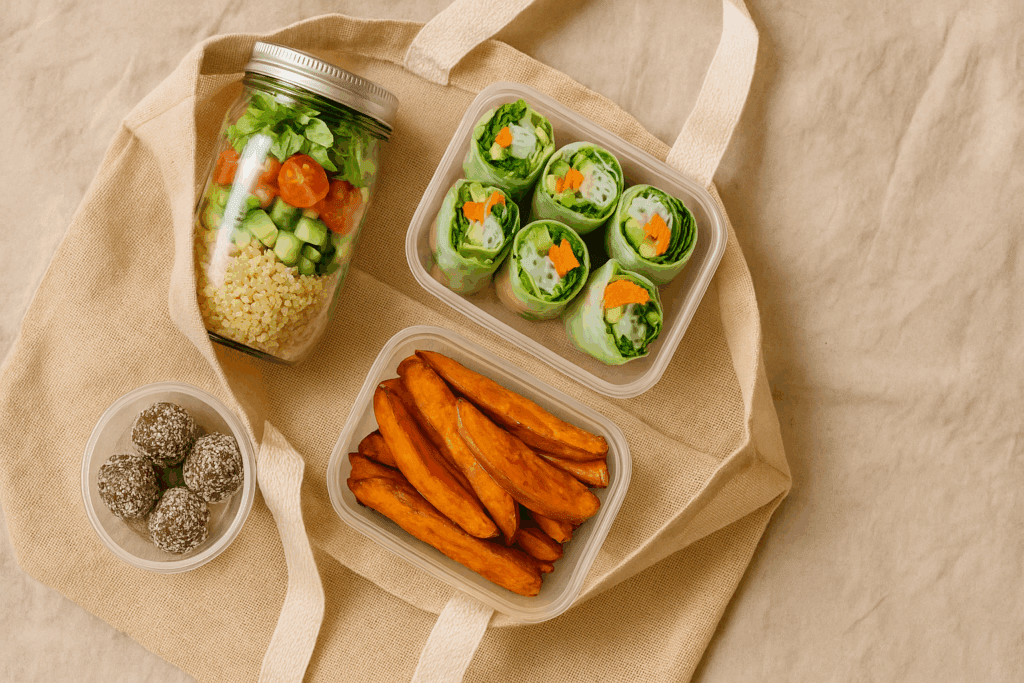
Conclusion: Choosing the Best Plant Based Snacks for Lasting Health
Smart snacking is an often-overlooked yet profoundly impactful element of plant-based living. It’s not about depriving oneself or settling for bland options—it’s about elevating everyday nourishment with foods that heal, energize, and satisfy. The best plant based snacks are not only delicious but also scientifically grounded in their ability to support metabolic function, gut health, weight balance, and overall vitality.
Whole food plant based snacks, when chosen with intention and consumed mindfully, transform a simple act of eating into a strategic investment in health. From fiber-packed roasted legumes and creamy avocado pairings to antioxidant-rich fruits and protein-dense soy options, healthy snacks for plant based diet adherents can be as varied as they are valuable.
By focusing on real, minimally processed ingredients and embracing diversity in flavors and textures, plant-based diet snacks can become an enjoyable ritual that supports wellness goals rather than undermining them. In a world filled with nutritional noise, the clarity and simplicity of whole plant foods remain a trusted compass. Snacking with purpose not only nourishes the body—it empowers the journey toward a vibrant, sustainable, plant-powered life.
Further Reading:
How Do I Make Sure I Get All the Nutrients I Need?

